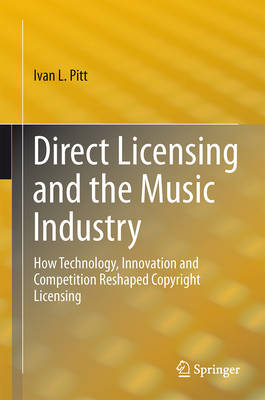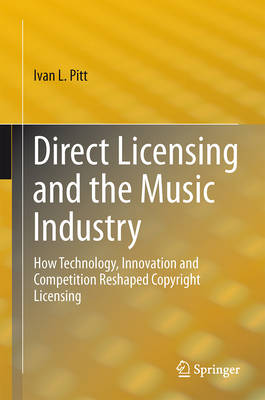
- Retrait gratuit dans votre magasin Club
- 7.000.000 titres dans notre catalogue
- Payer en toute sécurité
- Toujours un magasin près de chez vous
- Retrait gratuit dans votre magasin Club
- 7.000.0000 titres dans notre catalogue
- Payer en toute sécurité
- Toujours un magasin près de chez vous
Direct Licensing and the Music Industry
How Technology, Innovation and Competition Reshaped Copyright Licensing
Ivan L Pitt
Livre relié | Anglais
105,45 €
+ 210 points
Format
Description
This book discusses the economics of the music industry in the context of the changing landscape brought about by innovation, technological change, and rapid digitization. The ability of digital technology to reduce the transaction costs of music copyright licensing has all but destroyed the traditional media business models of incumbent Performance Rights Organizations (PROs), music publishers, record labels, and radio and television stations. In a climate where streaming services are rapidly proliferating and consumers prefer subscription models over direct ownership, new business models, such as direct licensing, are developing. This book provides an overview of the economics of the traditional music industry, the technology-induced changes in business models and copyright law, and the role of publishers, copyright holders and songwriters in the emerging direct licensing model. In Part One, the author examines the economic aspects of direct licensing as an alternative to the traditional blanket license for copyrighted musical compositions, with an emphasis on the often monopolistic nature of PROs. In Part Two, the author focuses on the music publisher and the role direct licensing and competition may play in the changing business models in the music industry and the potential benefits this may bring to copyright holders, such as songwriters. To compliment this model, the author proposes a maximum statutory fixed-rate for musical performances to further streamline the royalty process, especially where distributors such as Google and YouTube are concerned. This book adds to the growing body of literature on the economics of music licensing in the digital age. It will be useful to those in the fields of economics and law, as well as music executives, musicians, songwriters, composers, and other industry professionals who are interested in understanding how technology, innovation and competition have reshaped the music industry.
Spécifications
Parties prenantes
- Auteur(s) :
- Editeur:
Contenu
- Nombre de pages :
- 293
- Langue:
- Anglais
Caractéristiques
- EAN:
- 9783319176529
- Date de parution :
- 22-08-15
- Format:
- Livre relié
- Format numérique:
- Genaaid
- Dimensions :
- 158 mm x 242 mm
- Poids :
- 771 g

Les avis
Nous publions uniquement les avis qui respectent les conditions requises. Consultez nos conditions pour les avis.






